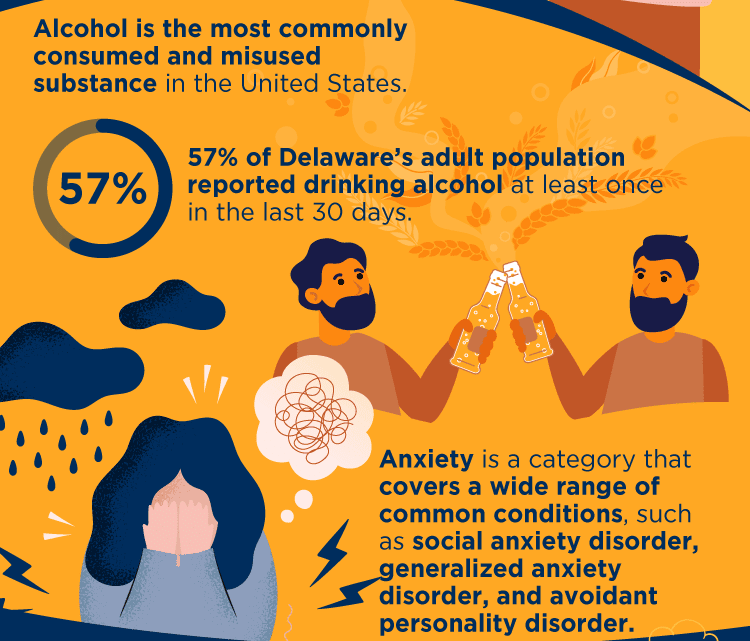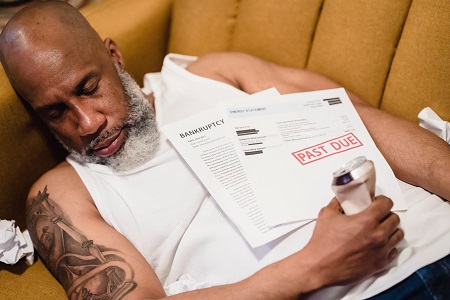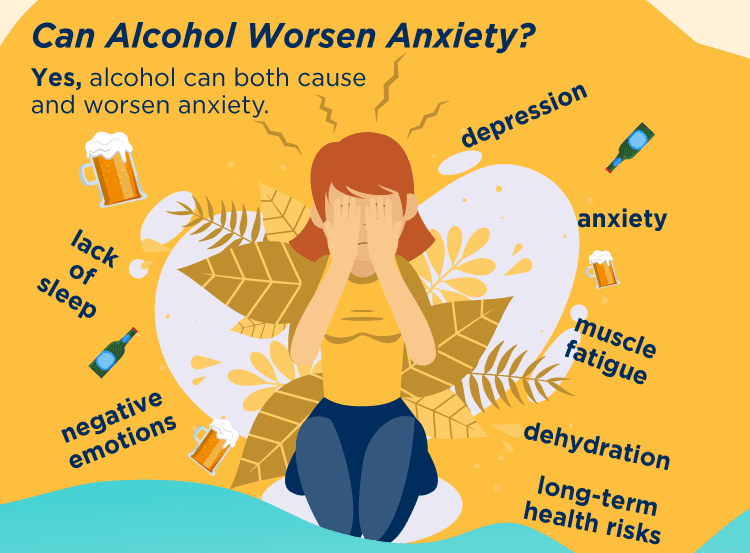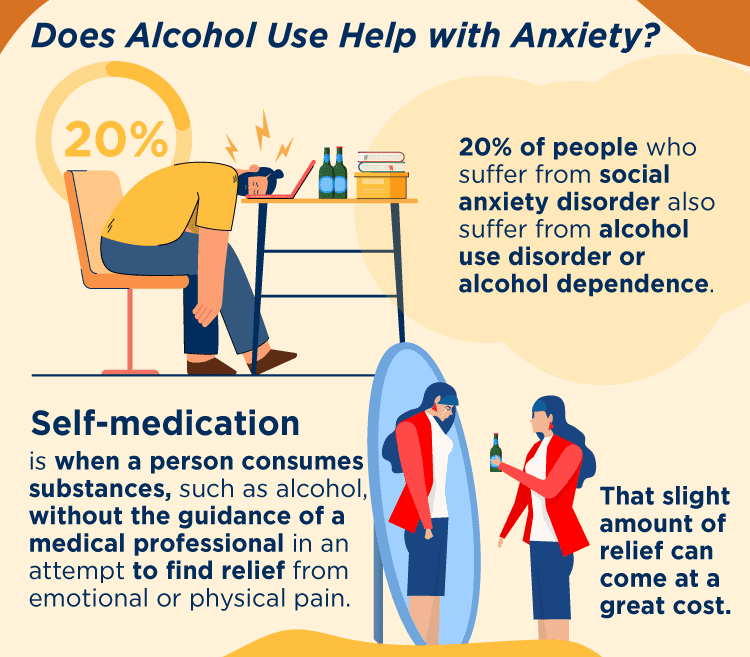Contents
Alcohol and anxiety disorder is not going to be good partners ever. Hence, it is better to keep them away from each other. To feel good, sometimes people with anxiety disorders end up addicted to alcohol or drugs. To treat anxiety-related issues, it is also important to treat alcohol addiction because drinking abuse for a person with anxiety disorder can prove fatal.
What are anxiety disorders?
As told earlier, it is normal to feel some extent of anxiety in our day-to-day lives. It could be a job interview, starting a new job, moving to a new place, exams, etc. This type of anxiety might not be pleasant, but it could motivate us to work harder and perform better.
When the feeling of fear is always with us, it is an anxiety disorder. Anxiety disorders are one of the most common forms of emotional disorder. It can affect anyone at any age.
Generalized Anxiety Disorder
Generalized Anxiety Disorder is a constant level of stress in life without being exposed to external stress factors. It refers to the development of phobias or irrational fears. Examples of triggers could be fears of someone breaking in, the house catching fire, etc. GAD (Generalized Anxiety Disorder) is one of the main reasons that turn some people to drinking alcohol as self-medication.
Social Anxiety Disorder
Social Anxiety Disorder is chronic anxiety under social circumstances. Sometimes it is incorrectly interpreted as shyness. But it is an anxiety disorder when someone is exposed to social settings or is involved in a social situation. Agoraphobia (the fear of being stuck far from home) can arise out of being in social situations. People under this type of disorder can imagine things that can happen if they cannot reach home, people hating them, etc.
Panic Disorder
Panic Disorders are prone to recurring and create severe panic attacks. They are very frequent. Panic attacks show symptoms such as sweating, pounding heart, shaking, choking, shortness of breath, etc. Intense panic attacks are very similar to heart attacks.
Other Anxiety Disorders
Anxiety disorders are dangerous, but some are more notorious than others, such as obsessive-compulsive disorder (OCD) and Post-Traumatic Stress Disorder (PTSD).
Reducing anxiety and alcohol – (Alcohol and anxiety)
In an anxious state, one might look forward to having a glass of Whisky or any other alcohol to calm the nerves. But doing this is not suitable for you. When you suffer from anxiety disorders, this habit might increase your anxiety and worsen your situation. If you have anxiety disorder and are drinking, prepare yourself for severe consequences.
Alcohol and Anxiety: In the beginning

Alcohol acts as a sedative and depressant, affecting CNS (central nervous system). In the beginning, it may seem that alcohol is helping you to cope with your troubles. It might make you relax and give a similar effect to antianxiety medication.
Once the drinking becomes regular, your body builds tolerance towards the de-stressing effects of alcohol. Drinking alcohol increases your blood alcohol content and creates a temporary sense of excitement. As soon as the blood alcohol level drops, depression and anxiety return. It can even make one more anxious than before. Over time, your consumption habit may lead to memory problems, blackouts, liver damage, etc., creating more anxiety.
How alcohol worsens anxiety

As per the Anxiety and Depression Association of America (ADAA), about 7 percent of Americans have an alcohol-induced anxiety disorder. Drinking alcohol changes the levels of serotonin and other neurotransmitters in our brain. It worsens anxiety, especially after the alcohol effect wears off. Alcohol-induced anxiety may last from several hours to a full day after drinking.
Alcohol and social anxiety
Persons with social anxiety tend to depend on alcohol as social interactions are unbearable for them. It creates alcohol dependency and makes the social disorder worse. More than 20 percent of people with a social anxiety disorder also suffer from alcohol dependency.
Hangovers from alcohol and anxiety
Too much alcohol consumption leads to hangovers. A hangover can cause symptoms like headaches, dizziness, nausea, dehydration, low blood glucose (sugar) level, etc., making you more anxious.
Can alcohol cause anxiety? -Alcohol and anxiety

People with long-term alcoholism show a variety of health problems, including mental health disorders. Alcohol abuse can lead to changes in brain activity. Heavy drinkers generally develop an anxiety disorder. Alcohol withdrawal also shows symptoms of anxiety disorders. Once an alcoholic person suddenly stops drinking, anxiety can be aggravated by the side effects of alcohol withdrawal.
Alcohol is not an anxiety treatment.
There are benefits of alcohol consumption when taken in “moderate” amounts. But ultimately benefits of the consumption of alcohol outweigh the risk, such as depression, obesity, liver disease, and cardiovascular disease, especially for a person with anxiety disorder.
Alcohol consumption affects different people differently. Avoid alcohol if you have a low tolerance for drinking, anxiety disorder of any kind, aggressive tendencies, a mental health disorder, etc. Remember, alcohol never is a treatment for anxiety. If you have an anxiety disorder, seek help from a mental health professional. Also, if you have a problem with alcohol, seek help from your doctor.
Relationship Between Alcohol and Anxiety
Abuse of alcohol and anxiety issues are closely related. Alcohol addiction and anxiety generally exist together. Anxiety is the reason for drinking and also a result of drinking.
Anxiety Disorders could be dangerous without treatment. Never self-medicate.
Self-Medicating Anxiety with Alcohol – Alcohol and anxiety
Anxiety disorders feed on CNS (central nervous system). It can increase heart rate and blood flow and push the brain into overdrive. Anxiety needs to be treated medically. Doctors might prescribe therapy or medication depending upon the type of anxiety and severity. There is a medicine called benzodiazepines generally prescribed by doctors, and they act as CNS depressants. The effects of benzodiazepines are very similar to the impact that alcohol provides.
Sometimes people suffering from anxiety turn to alcohol. It is prevalent among anxiety sufferers. Either they cannot afford therapy or feel embarrassed to seek medical help. Initially, it may seem to work but truth to be told, alcohol consumption to treat anxiety comes with a high cost.
Addiction To Alcohol and Anxiety as Co-Occurring Disorders-Alcohol and anxiety
People might like to have a drink or two after a hard day to alleviate stress. Still, for a person with anxiety disorder, it is quite possible that the drink to turn into three or five as they try to silence their mind. This kind of self-medication likely develops dependency and addiction. It is also very common for an addict to develop symptoms of anxiety.
For an alcohol addict suffering from an anxiety disorder, it is difficult to understand what came first, the egg or the chicken.
Treating Addiction to Alcoholism and Anxiety – Alcohol and anxiety
Many see alcoholism as an imminent danger and forget to discover the underlying anxiety issues. If those issues are not treated, the person will likely relapse. Alcohol is a quick, unhealthy way to relieve anxiety. Alcohol consumption does not delete underlying triggers. Your anxiety could be related to past trauma, untreated depression or financial stress. Those underlying triggers need to be appropriately addressed and treated.
Alcohol negatively affects the amygdala, the area of the brain that regulates negative emotions. Addiction to alcohol hinders your brain’s ability to respond to stress healthily and effectively. It can further lead to anxiety.
Can Alcohol Cause Anxiety or Make it Worse?
Alcohol usage worsens pre-existing anxiety symptoms and develops new-onset anxiety.
Do All Types of Alcohol Cause Anxiety?
It is not that wine or beer will cause less anxiety than hard liquor due to the alcohol content. It is not the type of alcohol but rather the amount and frequency of alcohol use that causes anxiety.
How Long Does Alcohol-Induced Anxiety Last?
Alcohol-induced anxiety may last from several hours to a full day after drinking.
Can Quitting Alcohol Cure Anxiety? – Alcohol and anxiety
Yes, it can if it is alcohol-induced anxiety. Or if you are self-medicating your underlying anxiety disorder with alcohol. Whether it is alcohol-induced anxiety or not, seek professional treatment. Depending upon your doctor, detoxification, inpatient treatment, outpatient treatment, medication, psychotherapy, participating in support groups, or a combination of these could help you overcome the issues.
How does drinking alcohol affect anxiety? – Alcohol and anxiety
Alcohol acts as a sedative and depressant, affecting CNS (central nervous system). In the beginning, it may seem that alcohol is helping you to cope with your troubles. It might make you relax and give a similar effect to antianxiety medication.
Once the drinking becomes regular, your body builds tolerance towards the de-stressing effects of alcohol. Drinking alcohol increases your blood alcohol content and creates a temporary sense of excitement. As soon as the blood alcohol level drops, depression and anxiety return. It can even make one more anxious than before. Over time, alcohol consumption may lead to memory problems, blackouts, liver damage, etc., creating more anxiety.
Alcohol and anxiety: The vicious circle

For a person with an anxiety disorder, it might occur that a couple of drinks will help you relax. Think again; see the vicious cycle below:
1: You drink alcohol
2: Feel calm as the alcohol affects the brain
3: You feel anxiety as a symptom of alcohol withdrawal as your body processes the alcohol
4: You want to drink again to relieve your anxiety
Back to square one.
How Much Alcohol Is Too Much – Alcohol and anxiety
The Centers for Disease Control and Prevention (CDC) provides specific definitions for “heavy drinking”. As per the CDC, one standard drink is the equivalent of:
- One 12-ounce bottle of beer (5% alcohol)
- OR one 5-ounce glass of wine (12% alcohol)
- OR one 8-ounce bottle of malt liquor (7% alcohol)
- OR 1.5 ounces of 80-proof distilled spirits or liquor (40% alcohol)
How does alcohol boost anxiety levels? – Alcohol and anxiety
Drinking causes an influx of the GABA (gamma-aminobutyric acid). It makes you feel relaxed and calm. But when the drinking stops, withdrawal symptoms begin to appear. The feeling of depression and anxiety follow.
Who is most likely to develop anxiety after a hangover? – Alcohol and anxiety
People suffering from depression and anxiety are most likely to develop anxiety after a hangover. Alcohol temporarily suppresses anxious feelings. But there is a rebound effect, which is far worse than the baseline level of anxiety.
How does alcohol compare to medications used to treat anxiety?
Benzodiazepines are used to treat anxiety by supplying GABA to the brain. A similar effect is noticed by consuming alcohol. But drinking to treat anxiety not only makes it worse but also damages your other vital organs such as the heart, liver, etc.
Can I drink alcohol if I have anxiety? – Alcohol and anxiety
It is better to avoid it altogether. Unknowingly you might set foot on the vicious circle of anxiety and alcohol and anxiety. Drinking can worsen your anxiety issues and push you to the path of no return without therapy and medication. Therefore, why go to that extent.
Will quitting drinking reduce anxiety? – Alcohol and anxiety
It depends. If you have alcohol-induced anxiety, then of course it does. But be careful about the withdrawal symptoms. Get proper medical professional help. But suppose it is a case of general anxiety disorder, social anxiety disorder, PTSD or any such issues. In that case, we recommend proper therapy or medication or both under the supervision of your doctor.
Can cut back on alcohol cause anxiety?
An increase in anxiety is a symptom of alcohol withdrawal. If you are an avid drinker and this went on for an extended period, then sudden cutting back can aggravate anxiety as a side effect of alcohol withdrawal.
References
- Anxiety and alcohol. (2021, August 10). SUN Delaware. https://sunbehavioral.com/delaware/anxiety-and-alcohol/
- Schuckit, M. A. (1996). Alcohol, anxiety, and depressive disorders. Alcohol Health and Research World, 20(2), 81–85.
- Smith, J. P., & Randall, C. L. (2012). Anxiety and alcohol use disorders: comorbidity and treatment considerations. Alcohol Research: Current Reviews, 34(4), 414–431.
